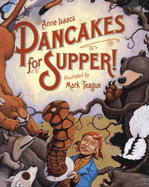

As a Black girl growing up in the '70s and '80s, the only thing I ever knew about Little Black Sambo, was that he was the prototype for every bad, dark-skinded, bug-eyed, red-lipped stereotype of Black people. I'd heard the name and even seen some "Sambo" images and figured that Little Black Sambo was probably the creation of some Evil White Devils who were still angry that the Yankees won the big war.
So imagine my surprise when just last week I was reading Anne Isaacs 2006 children's book, Pancakes for Supper and discovered that it was based on the original Little Black Sambo book by British author, Helen Bannerman. Intrigued, I found the text of the original story which was actually set in India, not America making Sambo, Indian not Black, and like Pancakes for Supper, found the story to be quite delightful. (Quite frankly, any story that ends with people eating a whole lot of pancakes is going to get two thumbs up from me.)
And yet I felt so wrong for liking it. Like I was being a traitor to my own race. And I felt somehow Ms. Isaacs shouldn't be able to profit from this controversial story, much less with Sambo re-imagined as a rosy-cheeked White girl. Blasphemy, I thought. Or heresy. Or some sort of moral/racial literary crime must have been committed.
But Anne Isaacs isn't the first to re-tell the Sambo story and she probably won't be the last. My feelings are probably irrational and unfair, but they're my feelings just the same and I wouldn't use them to do anything but provoke a conversation.
So does anybody else out there have a Sambo story to share?
Peace.
2 comments:
Hi Me,
I would just add that a lot of those Sambo-esque images that are mostly gone from the U.S are still in play in many other countries.
I am continually amazed and disheartened to read about other countries where those stereotypically racist images are still a part of pop culture.
Have you seen Julius Lester's Sam and the Tigers? I blogged about it last year here. I like it a lot. I had the same feeling about Sambo growing up. It's the racist stereotypes that used it and the terminology. The story itself, as retold by Lester, is really quite powerful. Christopher Bing did a version too.
Post a Comment